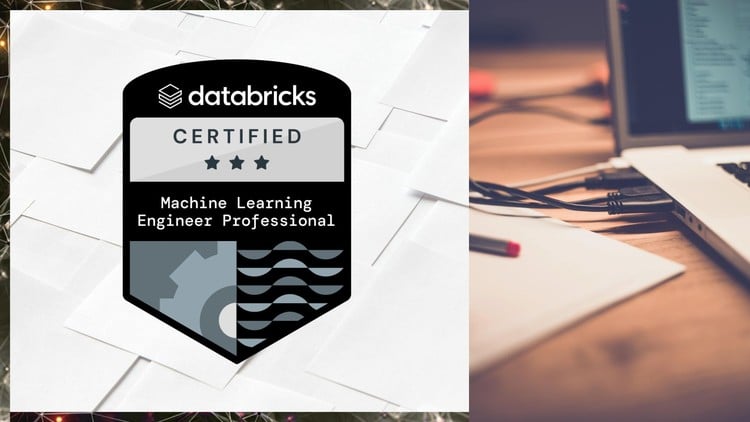
Advance your ML expertise with hands-on exam prep in deep learning, AI, and data modeling.
👥 15 students
Add-On Information:
Note➛ Make sure your 𝐔𝐝𝐞𝐦𝐲 cart has only this course you're going to enroll it now, Remove all other courses from the 𝐔𝐝𝐞𝐦𝐲 cart before Enrolling!
- Course Overview
- This intensive program offers a rigorous, simulation-based environment for machine learning practitioners targeting professional certification. It provides comprehensive practice exams meticulously designed to mirror the structure, difficulty, and question types of leading industry certifications, focusing on both theoretical depth and practical application under timed conditions.
- Participants will engage with a broad spectrum of real-world ML scenarios, spanning deep learning, artificial intelligence, and sophisticated data modeling techniques. The curriculum emphasizes strategic test-taking, effective time management, and an in-depth review of common challenges to build confidence.
- Limited to just 15 students, this cohort-based experience fosters an interactive learning community. It integrates peer discussions, collaborative problem-solving, and personalized instructor feedback, enabling a focused and supportive journey to solidify advanced expertise.
- Requirements / Prerequisites
- Advanced ML Fundamentals: A solid, proven understanding of core machine learning concepts, including various learning paradigms, model evaluation, and advanced feature engineering. This course is explicitly not for beginners but for those ready to validate mastery.
- Proficiency in Python & ML Libraries: Demonstrated hands-on capability with Python, encompassing NumPy, Pandas, Scikit-learn, and experience with data manipulation, analysis, and basic model implementation.
- Experience with Deep Learning Frameworks: Prior practical exposure to at least one major deep learning framework, such as TensorFlow or PyTorch, is essential, as the exams will cover complex neural network architectures and their deployment.
- Commitment to Rigorous Study: This demanding course requires significant dedication for self-study, material review, and active participation beyond structured sessions to maximize preparation for high-stakes certification exams.
- Skills Covered / Tools Used (Implicit in Practice Exams)
- Strategic Algorithm Selection: Master nuanced selection and application of advanced ML algorithms like ensemble methods, reinforcement learning, and generative models for optimal problem-solving across diverse datasets.
- Model Optimization Techniques: Develop expertise in hyperparameter tuning, cross-validation, regularization, and advanced model validation strategies to ensure robust, high-performing, and generalized ML solutions.
- Advanced Data Handling: Enhance skills in complex data preprocessing, including advanced imputation, outlier management, dimensionality reduction (e.g., PCA/t-SNE), and sophisticated feature engineering.
- Performance Metrics Mastery: Gain in-depth understanding of a wide array of evaluation metrics (e.g., ROC AUC, F1-score, precision-recall) for various problem types and interpret their implications for deployment.
- Ethical AI & Explainability Principles: Tackle critical aspects of responsible AI practice: bias detection, fairness, privacy, and methods for model interpretability (LIME/SHAP), vital for professional certification.
- MLOps & Deployment Concepts: Explore questions related to designing scalable ML pipelines, model versioning, continuous monitoring, and fundamental MLOps principles, often key for certification exams.
- Core ML Ecosystem Tools: Practice exams implicitly test proficiency with Python’s scientific stack (NumPy, Pandas), primary ML libraries (Scikit-learn), and deep learning frameworks (TensorFlow, PyTorch).
- Benefits / Outcomes
- Certification Readiness: Achieve unparalleled readiness and a strategic advantage for tackling official ML professional certification exams, significantly boosting first-attempt success.
- Validated Professional Competence: Obtain tangible proof of your advanced machine learning expertise, enhancing professional credibility and marketability in the competitive AI and data science job market.
- Targeted Skill Enhancement: Identify and systematically address individual knowledge gaps through detailed performance analytics and expert feedback, transforming weaknesses into profound strengths.
- Strategic Problem-Solving Prowess: Cultivate the ability to quickly analyze, strategize, and solve intricate machine learning problems under pressure, a critical skill for real-world professional challenges.
- Exclusive Peer Network: Benefit from invaluable interactions within a small, highly motivated cohort, fostering lasting professional connections and gaining diverse insights through collaborative learning.
- Accelerated Career Growth: Position yourself for significant career advancement by becoming a certified machine learning professional, opening doors to more challenging roles and leadership opportunities.
- PROS
- Specialized Exam Focus: Delivers highly targeted content and simulated environments specifically designed for ML professional certification exam success.
- Small Cohort Advantage: Ensures personalized attention and a rich, interactive learning experience within a limited group of 15 dedicated students.
- Practical Application Emphasis: Focuses on applying knowledge under exam conditions, mirroring real certification challenges, beyond just theory.
- CONS
- Prerequisite Intensive: Requires a substantial existing knowledge base and practical experience, making it unsuitable for individuals new to machine learning.
Learning Tracks: English,IT & Software,IT Certifications
Found It Free? Share It Fast!